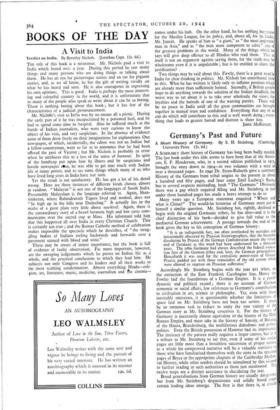BOOKS OF THE DAY
A Visit to India
THE title of this book is a misnomer. Mr. Nichols paid a visit to India which lasted over a year. During this period he saw many things and many persons who are doing things or talking about them. He has an eye for picturesque scenes and an ear for piquant stories, and, as we all know, he has the gift of writing vividly on what he has heard and seen. He is also courageous in expressing his own opinions. This is good. India is perhaps the most interest- ing and colourful country in the world, and it is unfortunate that so many of the people who speak or write about it can be so boring. There is nothing boring about this book ; but it has few of the characteristics of a judicial pronouncement.
Mr. Nichdls's visit to India was by no means all a picnic. During the early part of it he was incapacitated by a poisoned heel, and he had to spend some time in hospital. Also he suffered much at the hands of Indian journalists, who were very curious to know the object of his visit, and very suspicious. In the absence of evidence some of them drew freely on their imaginations for explanations. One newspaper, of which, incidentally, the editor was not an Indian but a fellow-countryman, went so far as to announce that he had been offered the post of Viceroy ; but Mr. Nichols is probably in error when he attributes this to a loss of the sense of humour. In spite of the handicap put upon him by illness and by suspicious and hostile newspaper ritten, he was able to get into touch with Indian life at many points, and to see some things which many of us who have lived long years in India have not seen.
Yet the result is not satisfactory. He has got a lot of his detail wrong. Here are three instances of different kinds chosen almost at random. " Malayan " is not one of the languages of South India. Presumably Malayalam is the language referred to. Again, Shan- tiniketan, where Rabindranath Tagore lived and worked, does- not " lie high up in the hills near Darjeeling." It actually lies in, the midst of a great plain very little above sea-level. Again, there is the extraordinary story of a brawl between high and low caste com- municants over the sacred cup at Mass. His informant told him that this happened all over India in every Christian Church. This is certainly not•true ; and the Roman Catholic method of celebration makes impossible the spectacle which he describes, of " the strug- gling bodies of Indians reeling backwards and forwards over a pavement stained with blood and wine." These may be errors of minor importance, but the book is full of evidence of faulty observation. Far more important, however, are the sweeping judgements which he passes on Indian life as a whole, and the practical conclusions to which they lead him. He subjects not only Congress and its leaders and all their works to the most scathing condemnation. Almost everything Hindu—reli- gion, art, literature, music, medicine, journalism and fhe cinema— comes under his lash. On the other hand, he has nothing but praise for the Muslim League, for its policy, and, above all, for its leader, Mr. Jinnah. He speaks of him as " a giant," as " the most important man in Asia," and as " the man most competent to solve" one of the greatest problems in the world. Many of the things which he says will give deep offence to all Hindus who read them. This in itself is not an-argument against saying them, for the truth may be wholesome even if it is unpalatable ; but is he entitled to claim this justification?
Two things may be said about this. Firstly, there is a great need in India for clear thinking in politics. Mr. Nichols has contributed link to this. What he has written is likely only to inflame passions which are already more than sufficiently heated. Secondly, if British people hope to do anything towards the solution of the Indian deadlock, the worst way to set about it is to take over wholesale the views, the loyalties and the hatreds of one of the warring parties. There will be no peace in India until all the great communities are brought together in mutual trust and confidence. Everything that any of us can do which will contribute to this end is well worth doing ; every- thing that leads to greater hatred and distrust is sheer loss.
JOHN MCKENZIE.


























 Previous page
Previous page